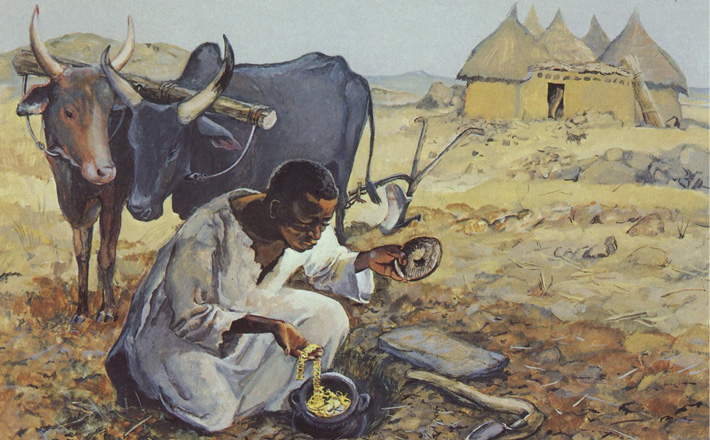Commentary on 1 Kings 3:5-12
“Ask me, what would you like me to give you?”
Solomon is at the crucial beginnings of his kingship when God poses this generous question. The divine question is particularly meaningful when considering the circumstances regarding the royal succession from his father David. Solomon was not the heir apparent to the throne.
That rite traditionally would go to the eldest living son Adonijah, as brothers Amnon and Absalon had already died. But Nathan and Bathsheba convinced a dying David to proclaim Solomon’s rights to the kingship. Furthermore, the theophany occurs at a high place (i.e, worship center) in Gibeon, significant for its role in both worship and the consolidation of the throne. The temple in Jerusalem has not yet begun construction.
Within such uncertainty, God’s question presents an opportunity that would soothe, comfort and assure a young king. God offers to give anything to Solomon to help secure his reign with an honest, “What do you want” (paraphrase mine)?
Imagine hearing such a request from a company CEO or billionaire philanthropist? If we are honest, many of us would want to respond to such a generous prompt with some sort of material riches. Similarly, Solomon could have justified a similar response, considering the needs of the young king. Thanks to the archaeology of the Near East, scholars understand that monarchies spent enormous efforts to create and maintain their own political legitimacy like this one. They built enormous monuments to display their great authority at sacred sites.
They commissioned royal inscriptions to narrate their tales of splendor.
They gathered luxury goods to feed the upper class of their constituents to win political approval as documented in these texts.
All of these efforts were especially vital during the succession period. So naturally, the king would seemingly respond to God’s generous prompt with elements that would insure a long, continued reign.
But Solomon delivers a remarkable reply to such generosity in verses six through nine:
- Praise for God’s actions: “You have shown great and steadfast love … you have kept for him this great and steadfast love” (verse 6).
- Humility: “I am only a little child; I do not know how to go out or come in” (verse 7).
- Recognition of inadequacy: “And your servant is in the midst of the people whom you have chosen, a great people, so numerous they cannot be numbered or counted” (verse 8).
This prayer to God then culminates in a surprising response to God’s offer. Solomon implicitly recognizes that for a king, such requests for worldly security violates earlier warnings from both Moses (Deuteronomy 17:16-17) as well as Samuel (1 Samuel 8:11-18). And with a wisdom more akin to the young Solomon requests:
“Give your servant therefore an understanding mind to govern your people, able to discern between good and evil; for who can govern this your great people” (verse 9)?
Solomon knows that a listening heart and an understanding mind are more valuable than traditional signs of kingship. The Hebrew words help unpack the richness in Solomon’s response. In Hebrew, the word “to listen” is the same word for “to obey.”
Also, the concept of “understanding” is not mere cognition, but integrates morality as seen with the clarification “able to discern between good and evil.” Solomon shuns disregards traditional royal culture of material and political favor, and asks for goodness over his ruling instruments to perpetuate God’s sovereignty.
God is pleased with earnest request for a listening heart and an understanding mind and commends the young king for not asking for life, riches, and safety from enemies. Interestingly, the requests for long life (Psalm 72:15), riches (Psalm 21:3, 5; 72:15-16) and death to opposition (Psalm 21:8-12) are actually biblical elements of a sustaining royal ideology. They are natural petitions for a young king, trying to legitimize a succession. But Solomon’s request is met, with the additional promise of “riches and honor.”
The conclusion of the passage must be carefully understood. How are we to theologically consider the role of “riches and honor” granted to Solomon from God, presumably as a blessing in response to Solomon’s good faith? This is where many modern interpretations fail us. In ancient Israel, riches are a sign of divine blessing, but remember that material riches look very different during the age of Solomon.
In our current monetary society, riches are often equated with individuals with assets many times more than the average household income. A monetary society allows us to stockpile and hoard such riches, and often riches are accumulated through unethical or minimally non-generous means. In a monetary society, riches are not always a blessing. In examining a theology of riches, the words of Jesus from the context of a more monetary Greco-Roman world, may better reflect our present day.
But Solomon ruled an agrarian kingdom. Coinage had not yet been invented and most scholars suggest that trade was based on duty, obligation through reciprocity, and not supply and demand of today’s societies. Riches for Solomon’s kingdom meant abundant harvest, protection from pestilence and adequate rainfall. All of these factors to production are difficult to stockpile. The agrarian life forced year after year dependence of God.
It is precisely this dependence on God that Solomon shows in his response. And God answered. Despite the warning in verse 14, Solomon’s line would eventually last over four hundred years, one of the longest, single-family reigns in known history. Although the economy has changed remarkably since the time of Solomon, a listening heart and understanding spirit still takes prime precedence for God’s people.


July 27, 2014